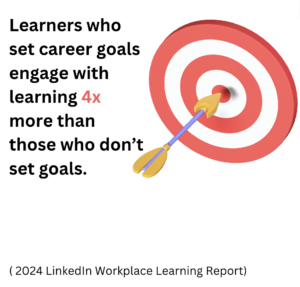 This is the 3rd installment of Pamela’s Summer of Learning Series.
This is the 3rd installment of Pamela’s Summer of Learning Series.
For many years, I taught a business creativity course to adult undergraduate students at DePaul University. In addition to learning various creativity theories, I devoted half the class time to improvisation games and eventually fully improvised scenes. The class allowed students to develop a pre-defined competence of “Can apply the theory and practice of improvisation to enhance workplace creativity.”
These sessions first taught me the importance of naming and sharing your learning goals and, more importantly, the value of holding your goals lightly and leaving some room for surprises.
The Value to Naming and Sharing Your Learning Goals
Research shows that committing to specific goals AND sharing them with others greatly enhances your likelihood of achieving them. Your chances of success are even greater if you share those results with someone whose status or authority you respect (e.g., a manager, mentor, or colleague you admire). This is particularly valuable when venturing into new territory demanding learning agility. For workplace learning, it can be especially effective to:
- • Draft and share your learning goals.
- • Keep a learning journal or other record of your experiences and lessons learned throughout your endeavor.
- • Share your progress and learning outcomes with a trusted friend, colleague, or mentor and, ideally, with a broader community, such as your team, or at your next Lunch & Learn session.
To get started, draft a short competence statement before you embark on your new learning adventure. You can download a competence statement template and example in the Summer of Learning Framework.
Distinguish Between Process and Performance Goals
As important as drafting learning goals is recognizing the learning that happens along the way to developing competence. These include expanding your network, becoming more comfortable learning in a new way, and even discovering talents you didn’t know you had.
In contrast, performance goals are the projected outcomes and impact of your learning. For example, will your new skills and knowledge help you increase sales, improve teamwork, or reduce time to market? In other words, “How will your new competence generate value for you and your stakeholders?”
Leave Room for Surprises
The growth that happens on our way to developing new competency is sometimes hard to predict, and these surprises can be the best part! Over the years teaching my creativity course, I witnessed and heard so many stories of transformation that I centered my doctoral research on the question, “What happens for people as they learn to improvise?” The findings inspired my book, From Workplace to Playspace: Innovating, Learning and Changing Through Dynamic Engagement.
 Success Story: How Starshine Got Her Groove Back
Success Story: How Starshine Got Her Groove Back
One woman’s journey stood out as especially surprising. In her first learning journal (which she permitted me to quote from using her nickname “Starshine”), she wondered why she had even registered for a class that included improvisation in the description. She described herself as “shy” and someone “who gets nervous in front of people” and “rarely speaks in class.” She lived into this identity for the first few weeks of class while still dutifully participating in all the class exercises, however uncomfortable they were. Then, one day, about halfway into the quarter, she was in a scene with two classmates, one well over a foot taller than she was. The improvisation scenario was a robbery taking place within a shoe store. Starshine, astonishing herself and her classmates, leaped into the scene with an imaginary gun and pulled the much taller male “shoe salesperson” into a playful headlock. The short scene quickly unfolded to peels of laughter as the formerly retiring Starshine took total control of the scene and “robbed” the improvised store of all of the latest styles in footwear.
In her journal that night, she described feeling “physically and mentally open for anything to come my way” and leaving the class with “a feeling of sureness, freedom, and optimism about me.”
In the following weeks and months, Starshine’s confidence within and beyond the classroom only grew. She later reported that she was now speaking up and sharing ideas more freely at work. She had joined Toastmasters and was even standing up to speak to her large congregation on Sundays, something she couldn’t have previously imagined.
 Why It’s Important to Hold Your Learning Goals Lightly
Why It’s Important to Hold Your Learning Goals Lightly
While Starshine demonstrated the pre-defined course competence, I share her story as a reminder of the value of setting learning goals; we should hold those goals lightly. By that, I mean that if we only focus on our pre-defined destination, we might miss all the additional ways we are learning and growing along the way.
In addition to “enhancing her workplace creativity,” Starshine deepened her relationships with her learning colleagues by becoming willing to share more of her playful self, encouraging them to do the same. She became a valuable faith community member by speaking up and inspiring others. And perhaps most importantly, she found her voice and developed confidence in her ability to think on her feet and contribute positively even in unfamiliar settings.
It wasn’t an explicit learning goal, yet the most valuable aspect of Starshine’s experience was the confidence she developed in her ability to learn and adapt to new and changing circumstances: her LEARNING AGILITY.
Pro Tip: This is an important reminder for my talent development colleagues as they measure the impact of their L&D strategies: Be sure your evaluations include open questions to discover the unexpected aspects of the learning experience. They may end up being even more impactful than your planned outcomes!
Bonus Resources
Here are a few resources to help you craft and refine your learning goals:
- More research on the value of articulating and sharing your learning goals.
- Ivey Business School Journal: Learning or Performance Goals: Is it the Journey or the Destination.
- If your friends, colleagues, and team members could use a boost of inspiration, please share the #SummerOfLearning “Learning Letter” sign-up link: Share SOL Newsletter!
